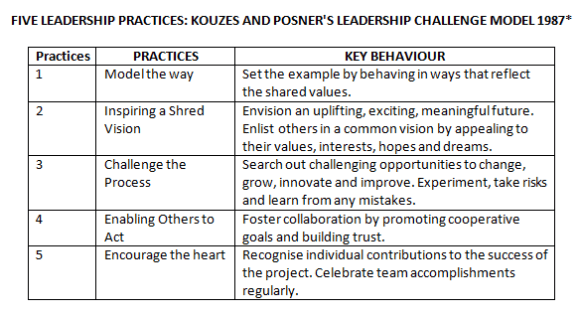Emotional Intelligence – A key Leadership competency

Emotional intelligence is the capacity to be aware of, control, and express one's emotions, and to handle interpersonal relationships judiciously and empathetically. Emotions are involved in every action, decision, and judgment. An emotionally intelligent person is able to manage his / her own emotions as well as emotions of others and it includes three important aspects,
- Emotional awareness
- Ability to apply emotions to the thinking process and problem-solving
- Ability to manage one’s own emotions and motivating others
First, let us look at what are “Emotions”? Emotions can be seen as feelings such as love, hate, anger, trust, joy, panic, fear, and grief, but they are different from “mood”. Emotions are specific reactions to a particular event of short duration. Mood is a more general feeling such as sadness, happiness, contentment, frustration etc. Emotions have both physical and mental components and are complex. Generally, researchers agree that emotions have the following parts: subjective feelings, physiological (body) responses, and expressive behavior.
The term emotional intelligence was first coined by the two researchers, Peter Salovoy and John Mayer (1990), and was made popular by Dan Goleman in his 1996 book of the same name. It has its roots in Darwin‘s early work on the importance of emotional expression for survival. In the 1900s, the traditional definitions of intelligence focussed on cognitive aspects such as memory and problem-solving. Later, many researchers had begun to be aware of the importance of the non-cognitive aspects. They understood the importance of non-cognitive aspects in the area of intelligence. Non-cognitive skills are a set of skills which fall outside the traditional skills and cannot be measured on standardized tests, yet researchers have proved it to be of utmost importance in our lives. Non-cognitive skills include self-control, optimism, resiliency, adaptability, conscientiousness, self-efficacy, and hope etc.
One of the main non-cognitive aspects is “emotions”, and it has valuable information about behavior, relationship, and nearly every aspect of human life around us. The most recent research shows that emotions are constructive and do contribute to enhance performance and better decision making both at job and in private life.
Work life and emotional intelligence: Re-Humanizing the workplace
Increasingly, workplace has become inhumane. Stress levels are at an all-time high, digitization has accelerated business to an almost incomprehensible speed. It is not humanly possible to keep up with the pressures and deadlines. On the other hand, life outdoors has taken on a violent and unsafe nature that is more stressful than the corporate stress. Today, we face a challenge to find ways to cope with it. One of the important tasks in front of the modern organizations is to “Re-Humanise” the workplace. This includes training the leaders of organizations to help regain some sanity in everyone’s life by re-humanizing the workplace.
The process of re-humanization starts with teaching a new type of emotional intelligence (EI). There is a need to find a new understanding of the term “compassion”- one that originates within ourselves and expands to include all others. One needs to find ways to increase emotional sensitivity and be more compassionate in order to be able to re-humanize the workplace. Moreover, one needs to develop a better emotional vocabulary, i.e. to identify what others are experiencing. Corporate leaders play a vital role in the process of re-humanizing the workplace. Leadership can be defined as the art of transforming people and the organization with the aim of improving the organization. Leaders develop a relationship between themselves and their followers by aligning, motivating and inspiring the followers to foster productivity. Leaders play a key role in organizational transformation, which brings positive change in the organization, groups, interpersonal relationships and the environment.
Emotional Intelligence and Effective Leadership
Leadership is a personal thing comprising one’s heart, head and hand. (Sergiovanni (1999). The heart of leadership deals with one’s beliefs, values, and vision. The ‘head’ of leadership is the experiences one has accumulated over time and the ability to perceive present situations in the light of these experiences. The ‘hand’ of leadership, according to him, is the actions and decisions that one takes. In essence, leadership is the act of leading, which reflects the leader’s values, vision, experiences, personality, and ability to use past experiences to tackle the situation at hand. Leadership style presents a persona’s holistic personality in terms of his level of intelligence, perceptions, ideas, values, and knowledge coming into play, causing necessary changes in the organization.
In the leadership model proposed by Kouzes and Posner (1987), emotional intelligence has a direct bearing on leadership practice 4 and 5 (enabling others to act and encourage the heart). As explained earlier, emotional intelligence is recognizing, understanding and managing one’s own emotions and recognizing, understanding and influencing the emotions of others in order to achieve a common objective. Effective and emotionally intelligent leadership can bring in a positive change in organizational culture, which can prove to be instrumental in re-humanizing the workplace.

Corporate leaders can bring in a fresh change in thought process of young minds by applying emotional intelligence. With a solid foundation in our own sensitivity to our collective plight, we may stand a chance of providing something that is a little closer to a humane work environment.
Source:















